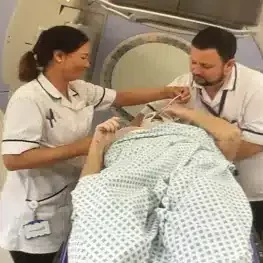Surgery
Surgery for head and neck cancer is a common treatment approach aimed at removing cancerous tumours and affected tissues in the head and neck region. A key goal is to remove the cancer completely. However, surgery is often done together with other cancer treatments such as chemotherapy and / or radiation therapy, to eliminate remaining cancer cells and reduce the risk of recurrence. This is called adjuvant therapy. Reconstructive surgery may alter how you look, or speak, or be able to eat or drink. It's crucial to discuss the specifics of the surgery, potential risks, and expected outcomes with the surgical team to make informed decisions about the treatment plan. The multidisciplinary approach involving surgeons, oncologists, nursing and other allied health care specialists ensures comprehensive care for individuals with head and neck cancer. These teams can vary from hospital to hospital, region to region, so it would be worth finding out who is in your team, and what role they may play in determining your care and treatment for the coming months.
Here's a general overview of what to expect:
General Information
A quick overview of what to expect
Radiotherapy/Chemotherapy
A quick overview of what to expect
Preoperative Evaluation
Before surgery, a thorough evaluation will be conducted to assess the extent of the cancer, your overall health, and the feasibility of different types of surgical procedures that may be carried out. As well as the primary tumour and any affected surrounding tissues, lymph nodes in the neck may also be examined to consider their removal as well.
Types Of Surgery
The specifics of the surgery depend on the location, size, and stage of the cancer. If the cancer is caught early on and the tumour is still very small, it may be possible to remove the tumour with laser surgery (or a simple operation) with you as a day patient. More often than not, surgery will be more complex, and you should expect to have a stay in the hospital. Surgery may mean that you will have difficulty breathing afterwards, and if so, you will be told beforehand if you need to have a tracheostomy. Surgery may mean that you will have difficulty eating and drinking afterwards, and if so, you will be told beforehand if you need to have a gastrostomy (feeding) tube inserted through your nose into your stomach. While these extra tubes sound very scary, they are only temporary, and are only there to help your body along during some of the worst parts of the treatment. Your medical team will all be experts and you should feel safe in their hands.
Potential Complications : Like any surgery, there are risks involved. Complications may include infection, bleeding, damage to nearby structures, and changes in speech, swallowing, or appearance. However, complications are not common, and your medical team will talk you through all the risks before anything is done.
Jono, Laryngectomy patient ( 2022-2023) writes:
I was diagnosed with stage 3 laryngeal and thyroid cancer on 16th Nov 2022. Scans and biopsies followed on a whirlwind of appointments and tests. So finally, when all the results were in it was the 19th December, but i was told my cancer was stage 4 and rads and chemo would not do the job, and that I would need surgery, a total laryngectomy. On the 9th Jan at 9am I had a total laryngectomy - that is the removal of the whole voicebox. I also had my thyroid and 84 lymph nodes removed. This was followed by 14 days in hospital learning how to manage my new life. being taught how to breath, eat, swallow and talk again.
Once I was home, boy was that scary, with my suction machine and nebulisers. I rested in my newly adapted room with a hospital bed. The nights were very quiet and very lonely. I contemplated stuff a lot. After 3 weeks it was a daily ambulance ride to the Royal Marsden hospital to have 6 weeks of radiotherapy and 2 chemo shots. This part was harder than surgery for me and I did not like it one bit.
Length Of Stay In Hospital
The length of time you will stay in hospital will vary depending on the complexity of the surgery undertaken. You may only be in hospital for a couple of days, or you may be in intensive care for considerably longer. As surgery is being done to your head and neck, you will be attached to drips and drains for up to a week, because it is likely that your mouth and throat will experience considerable swelling. You may have a feeding tube fitted (e.g. a nasogastric tube) that will help you take in needed nutrients and fluids. This will normally be fitted at the same time as your surgery, but may be kept in until the end of your adjuvant chemoradiation therapy, as these can also cause problems with drinking and eating. Surgery can cause problems with breathing, and a tracheostomy tube may also be fitted during tumour removal and reconstructive surgery, but this is normally removed a few days later.
Postoperative Care
◦ Hospital Stay: The length of hospitalisation varies depending on the complexity of the surgery.
◦ Pain Management: Pain is managed through medications to ensure comfort during the recovery period.
◦ Nutritional Support: Depending on the type of surgery and potential impact on swallowing, nutritional support may be required from your dietitian and speech and language therapist.
Recovery and Rehabilitation
◦ Follow-up Care: Regular follow-up appointments are essential to monitor recovery and address any concerns.
◦ Rehabilitation: Speech therapy, physical therapy, and other forms of rehabilitation may be necessary to regain function, especially if the surgery has affected speech or swallowing.
It's crucial to discuss the specifics of the surgery, potential risks, and expected outcomes with the surgical team to make informed decisions about the treatment plan. The multidisciplinary approach involving surgeons, oncologists, and other specialists ensures comprehensive care for individuals with head and neck cancer.
How to manage the side-effects of surgery
It's important to note that the specific treatment effects can vary widely among individuals, and your medical team will provide personalised information based on your specific case. Rehabilitation, speech therapy, physical therapy, and other supportive measures may be recommended to help manage and improve these effects.
Jono, Laryngectomy patient ( 2022-2023) writes:
Once home after all the treatment you kind of lick your wounds. My mental health was suffering badly and I was struggling with my new life. The after effects are still there a year post surgery. My intimacy life with my wife has changed. The whole relationship has changed and now she adds Jons nurse to her CV. We sleep in separate rooms; I am awake half the night clearing my tracheotomy, and I have a single hospital bed.
I have nerve damage from surgery and radiotherapy.I have a suspected crushed vertebrae and slipped disk.I take 3 different types of opioids every 4 hours 24 hours a day for the pain and have done so for a year. I struggle with neuropathy. numb hands and feet also swelling feet. This is from chemotherapy.I have no sense of smell. cut during surgery and I am deaf in one ear from chemo. So daily life is difficult and the maintenance of the stoma is difficult and I live with a lot of pain.
BUT I live. My purpose now is to help others. If I had the chance to talk to every medical personnel and every patient I would say this to them:
To Doctors and other medical personnel "this is your 9 to 5 but it's our life, be patient with us and give us the time we deserve to talk to you".
To patients going through cancer treatments. "There is light at the end of the tunnel, it has not been switched off, it is still there. keep going"
General Information
A quick overview of what to expect
Radiotherapy/Chemotherapy
A quick overview of what to expect
Surgery
A quick overview of what to expect
What To Expect



